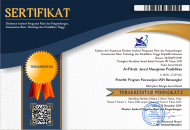LEADERSHIP MANAGEMENT OF EDUCATION AND PERSONALITY LEADERS OF INDUSTRIAL REVOLUTION 4.0
Abstract
The industrial revolution 4.0 opened the eyes of every leader to fundamentally change, in every aspect of life. Changes and effects of the 4.0 revolution on education, progress and improvement in the quality and personality of its leaders. The development of science and technology undeniably influences the process of school organization in producing outputs that are ready to compete in the world of big data and discruptions. Responding to the challenges of the digital age, leaders need to prepare capable and skilled human resources, able to solve problems, communicate and collaborate with all lines. Teachers must get out of the mindset and safety zone for the learning process in an all-digital era and the principal is prepared externally and internally to adjust to the development of the industrial era 4.0 and distribution. The leader's personality is the total ethical appearance in leading and communicating and socializing with members of the organization.
Full Text:
Download PDF (Bahasa Indonesia)References
Aidt, T., & Rauh, C. (2018). The Big Five personality traits and partisanship in England. Electoral Studies, 54, 1–21. doi:10.1016/j.electstud.2018.04.017
Alkahtani, A. H., Abu-Jarad, I., Sulaiman, M., & Nikbin, D. (2011). The impact of personality and leadership styles on leading change capability of Malaysian managers. Australian Journal of Business and Management Research, 1(2), 70.
Annizah dan Winnda Fitri Maretta . 2017. Jurnal. Manajemen, Kepemimpinan dan supervisi Pendidikan. Vol 2 no 1. Januari – Juni 2017
Antes, A. L., Mart, A., & DuBois, J. M. (2016). Are Leadership and Management Essential for Good Research? An Interview Study of Genetic Researchers. Journal of Empirical Research on Human Research Ethics, 11(5), 408–423. doi:10.1177/1556264616668775
Bush, T. (2018). Distributed leadership and bureaucracy: Changing fashions in educational leadership. Educational Management Administration & Leadership, 47(1), 3–4. doi:10.1177/1741143218806704
Bush, T., & Glover, D. (2016). School leadership and management in South Africa. International Journal of Educational Management, 30(2), 211–231. doi:10.1108/ijem-07-2014-0101
Connolly, M., James, C., & Fertig, M. (2017). The difference between educational management and educational leadership and the importance of educational responsibility. Educational Management Administration & Leadership, 174114321774588. doi:10.1177/1741143217745880
Hallinger, P. (2018). A systematic review of research on educational leadership and management in South Africa: mapping knowledge production in a developing society. International Journal of Leadership in Education, 1–19. doi:10.1080/13603124.2018.1463460
Hallinger, P., & Chen, J. (2014). Review of research on educational leadership and management in Asia. Educational Management Administration & Leadership, 43(1), 5–27. doi:10.1177/1741143214535744
Hamid Hassan , Sarosh Asad , Yasuo Hoshino . "Determinants of Leadership Style in Big Five Personality Dimensions." Universal Journal of Management 4.4 (2016) 161 - 179. doi: 10.13189/ujm.2016.040402.
Hogan, R., & Judge, T. (2013). Personality and leadership. The Oxford handbook of leadership, 37-46.
Judge, T. A., Bono, J. E., Ilies, R., & Gerhardt, M. W. (2002). Personality and leadership: A qualitative and quantitative review. Journal of Applied Psychology, 87(4), 765–780. doi:10.1037/0021-9010.87.4.765
Kanki, B. G. (2019). Communication and crew resource management. In Crew resource management (pp. 103-137). Academic Press.
Klein, A., Kiranda, Y., & Bafaki, R. (2011). Concepts and Principles of Democratic Governance and Accountability.
Marsiglia, A. J. (2005). The relationship between leadership and personality. Saatavissa: http://lead-inspire. com/Papers-Articles/Leadership-Management/The% 20Relationship% 20between% 20leadership% 20and% 20Personality. pdf.[Luettu 15.10. 2013].
Marume & Jaricha. (2016). Styles of Leadership in Institutions. International Journal of Business and Management Invention, 5 (5), 72-77
Özbağ, G. K. (2016). The Role of Personality in Leadership: Five Factor Personality Traits and Ethical Leadership. Procedia - Social and Behavioral Sciences, 235, 235–242. doi:10.1016/j.sbspro.2016.11.019
Van Vugt, M., Jepson, S. F., Hart, C. M., & De Cremer, D. (2004). Autocratic leadership in social dilemmas: A threat to group stability. Journal of Experimental Social Psychology, 40(1), 1–13. doi:10.1016/s0022-1031(03)00061-1
Western, S. (2019). Leadership: A critical text. SAGE Publications Limited.
Yahaya, N., Taib, M. A. B. M., Ismail, J., Shariff, Z., Yahaya, A., Boon, Y., & Hashim, S. (2011). Relationship between leadership personality types and source of power and leadership styles among managers. African Journal of Business Management, 5(22), 9635-9648.
Zaccaro, S. J. (2014). Leadership memes: From ancient history and literature to twentyfirst century theory and research. In D. V. Day (Ed.). The Oxford handbook of leadership and organizations (pp. 13–39). New York: Oxford.
DOI: http://dx.doi.org/10.31958/jaf.v8i2.2616
Refbacks
- There are currently no refbacks.
Copyright (c) 2020 Demina Demina

This work is licensed under a Creative Commons Attribution-NonCommercial 4.0 International License.
__________________________________________________________________________
 | Al-Fikrah: The Journal of Educational Management |
Creations are disseminated below Lisensi Creative Commons Atribusi-NonKomersial 4.0 Internasional.













